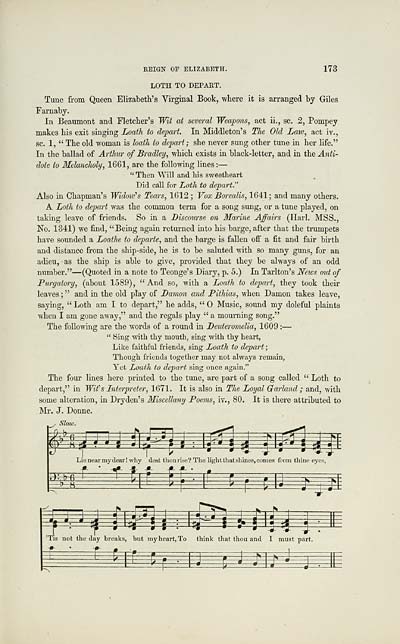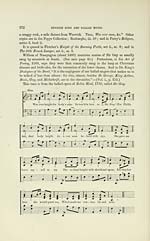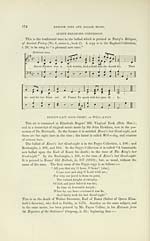Glen Collection of printed music > Printed text > Popular music of the olden time > Volume 1
(207) Page 173 - Loth to depart
Download files
Complete book:
Individual page:
Thumbnail gallery: Grid view | List view

REIGN OF ELIZABETH.
173
LOTH TO DEPAKT.
Tune from Queen Elizabeth's Virginal Book, where it is arranged by Giles
Farnaby.
In Beaumont and Fletcher's Wii at several Weapons, act ii., sc. 2, Pompey
makes his exit singing Loath to depart. In Middleton's The Old Law, act iv.,
sc. 1, " The old woman is loath to depart; she never sung other tune in her life."
In the ballad of Arthur of Bradley, which exists in black-letter, and in the Anti-
dote to Melancholy, 1661, are the following lines : —
" Then Will and his sweetheart
Did call for Loth to depart."
Also in Chapman's Widoiu's Tears, 1612 ; Vox Borealis, 1641; and many others.
A Loth to depart was the common term for a song sung, or a tune played, on
taking leave of friends. So in a Discourse on Marine Affairs (Harl. MSS.,
No. 1341) we find, "Being again returned into his barge, after that the trumpets
have sounded a Loathe to departe, and the barge is fallen off a fit and fair birth
and distance from the ship-side, he is to be saluted with so many guns, for an
adieu, as the ship is able to give, provided that they be always of an odd
number." — (Quoted in a note to Teonge's Diary, p. 5.) In Tarlton's Neivs out of
Piirgatory, (about 1589), "And so, with a Loath to depart, they took their
leaves ; " and in the old play of Damon and Pithias, when Damon takes leave,
saymg, " Loth am I to depart," he adds, " Music, sound my doleful plaints
when I am gone away," and the regals play " a mourning song."
The following are the words of a round in D enter omelia, 1609 : —
" Sing with thy mouth, sing with thy heart,
Like faithful friends, sing Loath to depart;
Though friends together may not always remain,
Yet Loath to depart sing once again."
The four lines here printed to the tune, are part of a song called " Loth to
depart," in Wifs Lnterpreter, 1671. It is also in TJie Loyal Q-arland ; and, with
some alteration, in Dryden's Miscellany Poems, iv., 80. It is there attributed to
Mr. J. Donne.
Slow.
m
^
3
r^j tufe
P^iP
^
a
M
« '^
Lie near my dear! why dost thourise? The light that shines, comes fiom thine eyes
;?FFft
^'^t \ t !f
s
^
p
W^t
'i=i
n
^
'Tis not the day breaks, but my heart, To think that thou and I must part
^
h
173
LOTH TO DEPAKT.
Tune from Queen Elizabeth's Virginal Book, where it is arranged by Giles
Farnaby.
In Beaumont and Fletcher's Wii at several Weapons, act ii., sc. 2, Pompey
makes his exit singing Loath to depart. In Middleton's The Old Law, act iv.,
sc. 1, " The old woman is loath to depart; she never sung other tune in her life."
In the ballad of Arthur of Bradley, which exists in black-letter, and in the Anti-
dote to Melancholy, 1661, are the following lines : —
" Then Will and his sweetheart
Did call for Loth to depart."
Also in Chapman's Widoiu's Tears, 1612 ; Vox Borealis, 1641; and many others.
A Loth to depart was the common term for a song sung, or a tune played, on
taking leave of friends. So in a Discourse on Marine Affairs (Harl. MSS.,
No. 1341) we find, "Being again returned into his barge, after that the trumpets
have sounded a Loathe to departe, and the barge is fallen off a fit and fair birth
and distance from the ship-side, he is to be saluted with so many guns, for an
adieu, as the ship is able to give, provided that they be always of an odd
number." — (Quoted in a note to Teonge's Diary, p. 5.) In Tarlton's Neivs out of
Piirgatory, (about 1589), "And so, with a Loath to depart, they took their
leaves ; " and in the old play of Damon and Pithias, when Damon takes leave,
saymg, " Loth am I to depart," he adds, " Music, sound my doleful plaints
when I am gone away," and the regals play " a mourning song."
The following are the words of a round in D enter omelia, 1609 : —
" Sing with thy mouth, sing with thy heart,
Like faithful friends, sing Loath to depart;
Though friends together may not always remain,
Yet Loath to depart sing once again."
The four lines here printed to the tune, are part of a song called " Loth to
depart," in Wifs Lnterpreter, 1671. It is also in TJie Loyal Q-arland ; and, with
some alteration, in Dryden's Miscellany Poems, iv., 80. It is there attributed to
Mr. J. Donne.
Slow.
m
^
3
r^j tufe
P^iP
^
a
M
« '^
Lie near my dear! why dost thourise? The light that shines, comes fiom thine eyes
;?FFft
^'^t \ t !f
s
^
p
W^t
'i=i
n
^
'Tis not the day breaks, but my heart, To think that thou and I must part
^
h
Set display mode to: Large image | Transcription
Images and transcriptions on this page, including medium image downloads, may be used under the Creative Commons Attribution 4.0 International Licence unless otherwise stated. ![]()
| Special collections of printed music > Glen Collection of printed music > Printed text > Popular music of the olden time > Volume 1 > (207) Page 173 - Loth to depart |
|---|
| Permanent URL | https://digital.nls.uk/91369931 |
|---|
| Shelfmark | Glen.254 |
|---|---|
| Additional NLS resources: | |
| Attribution and copyright: |
|
| Description | Scottish songs and music of the 18th and early 19th centuries, including music for the Highland bagpipe. These are selected items from the collection of John Glen (1833 to 1904). Also includes a few manuscripts, some treatises, and other books on the subject. |
|---|
| Description | The Glen Collection and the Inglis Collection represent mainly 18th and 19th century Scottish music, including Scottish songs. The collections of Berlioz and Verdi collected by bibliographer Cecil Hopkinson contain contemporary and later editions of the works of the two composers Berlioz and Verdi. |
|---|

